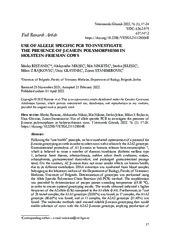Приказ основних података о документу
Use of allele specific PCR to investigate the presence of β-casein polymorphism in Holstein-Friesian cows
Upotreba allele specific pcr-a u ispitivanju prisustva polimorfizma β -kazeina kod holštajn-frizijskih krava
| dc.creator | Ristanić, Marko | |
| dc.creator | Nikšić, Aleksandar | |
| dc.creator | Niketić, Mia | |
| dc.creator | Jelisić, Stefan | |
| dc.creator | Rajković, Milan | |
| dc.creator | Glavinić, Uroš | |
| dc.creator | Stanimirović, Zoran | |
| dc.date.accessioned | 2022-09-14T07:49:57Z | |
| dc.date.available | 2022-09-14T07:49:57Z | |
| dc.date.issued | 2022 | |
| dc.identifier.issn | 0350-2457 | |
| dc.identifier.issn | 2406-0771 | |
| dc.identifier.uri | https://vet-erinar.vet.bg.ac.rs/handle/123456789/2480 | |
| dc.description.abstract | Following the “one health” principle, we have conducted optimization of a protocol for β-casein genotyping in cattle in order to select cows with exclusively the A2A2 genotype. Gastrointestinal proteolysis of A1 β-casein in humans releases beta-casomorphin 7, which is believed to cause a number of diseases/conditions (diabetes mellitus type 1, ischemic heart disease, atherosclerosis, sudden infant death syndrome, autism, schizophrenia, gastrointestinal discomfort, and prolonged gastrointestinal passage time). On the contrary, A2 β-casein does not cause similar effects on human health, due to its different metabolism. DNA extraction was conducted from blood samples belonging to the laboratory archive of the Department of Biology, Faculty of Veterinary Medicine, University of Belgrade. Determination of genotypes was performed using the Allele Specific Polymerase Chain Reaction (AS-PCR) method. The amplification was preceded by determination of proper primer annealing temperature (65.50 °C), in order to ensure optimal genotyping results. The results obtained indicated a higher frequency of the A2 allele (0.56) compared to the A1 allele (0.44). Furthermore, in 7 out of 35 tested samples, the A1A1 genotype (20.00%) was found, in 17 samples, the A1A2 genotype (48.60%) was found, and in 11 samples, the A2A2 genotype (31.40%) was found. The molecular methods used ensured reliable β-casein genotyping that would enable selection of cows with the A2A2 β-casein genotype, implying production of. | |
| dc.description.abstract | Kazeini čine 80% ukupnih proteina mleka, dok β-kazein i njegove varijante A1 i A2 zauzimaju značajno mesto u istraživanjima različitih autora. Metabolisanjem A1 tipa kod ljudi oslobađa se betakazomorfin-7, koji može da izazove niz oboljenja (dijabetes melitus tip 1, ishemijsku bolest srca, arterosklerozu, sindrom iznenadne smrti odojčadi, autizam, šizofreniju, nelagodnost u gastrointestinalnom sistemu i produženo vreme gastrointestinalne pasaže). Nasuprot tome, metaboliti A2 tipa β-kazeina, usled drugačijeg metabolisanja, ne izazivaju slične efekte po zdravlje ljudi. Cilj ovog istraživanja je bio optimizacija protokola za utvrđivanje polimorfizma β-kazeinskog gena u selekciji krava sa A2A2 genotipom, a prateći principe “jednog zdravlja”. Za analize su korišćeni uzorci krvi iz laboratorijske arhive Katedre za biologiju FVM UB. Amplifikacija i detekcija aminokiselinske razlike između dva tipa β-kazeinskog proteina izvođena je metodom alelski specifične lančane reakcije polimeraze (Allele Specific Polymerase Chain Reaction-AS-PCR), kojoj je prethodila optimizacija temperature hibridizacije prajmera. Vizualizacija rezultata izvedena je pomoću gel-elektroforeze koja je omogućila uočavanje PCR amplikona specifičnih za oba različita alela β-kazeinskog gena, veličine 244 baznih parova. Analizama temperature hibridizacije prajmera, temperatura od 65,50 °C pokazala se kao optimalna. Dobijeni rezultati isptivanja su ukazali na veću frekvencu prisustva alela A2 (0,56) u odnosu na alel A1 (0,44) u ispitivanim uzorcima. Istovremeno od ukupno 35 ispitanih uzoraka kod 7 uzoraka krvi je bilo potvrđeno prisustvo genotipa A1A1 (20,0%), kod 17 uzoraka genotipa A1A2 (48,60%), odnosno kod 11 uzoraka genotipa A2A2 (31,40%). Korišćenjem ove i sličnih metoda u programima uzgoja goveda, mogla bi se izvršiti selekcija goveda koja imaju A2A2 genotip β-kazeina, što bi uslovilo proizvodnju kravljeg mleka bez neželjenog A1 β-kazeinskog proteina i svih njegovih implikacija po zdravlje ljudi. | |
| dc.publisher | Faculty of Veterinary Medicine, University of Belgrade | |
| dc.relation | This study was supported and financed by the International Atomic Energy Agency (Contract No. 20774) which forms part of the IAEA Coordinated Research Project D31028 | |
| dc.rights | openAccess | |
| dc.rights.uri | https://creativecommons.org/licenses/by/4.0/ | |
| dc.source | Veterinarski glasnik | |
| dc.subject | β-casein | |
| dc.subject | allele | |
| dc.subject | AS-PCR | |
| dc.subject | Holstein-Friesian | |
| dc.subject | polymorphism | |
| dc.subject | β-kazein | |
| dc.subject | aleli | |
| dc.subject | holštajn-frizijska | |
| dc.subject | polimorfizam | |
| dc.title | Use of allele specific PCR to investigate the presence of β-casein polymorphism in Holstein-Friesian cows | |
| dc.title | Upotreba allele specific pcr-a u ispitivanju prisustva polimorfizma β -kazeina kod holštajn-frizijskih krava | |
| dc.type | article | en |
| dc.rights.license | BY | |
| dc.citation.volume | 76 | |
| dc.citation.issue | 1 | |
| dc.citation.spage | 17 | |
| dc.citation.epage | 24 | |
| dc.citation.rank | M51~ | |
| dc.identifier.doi | 10.2298/VETGL211125004R | |
| dc.identifier.scopus | 2-s2.0-85129722199 | |
| dc.identifier.fulltext | http://veterinar.vet.bg.ac.rs/bitstream/id/7101/0350-24572200004R.pdf | |
| dc.type.version | publishedVersion |

